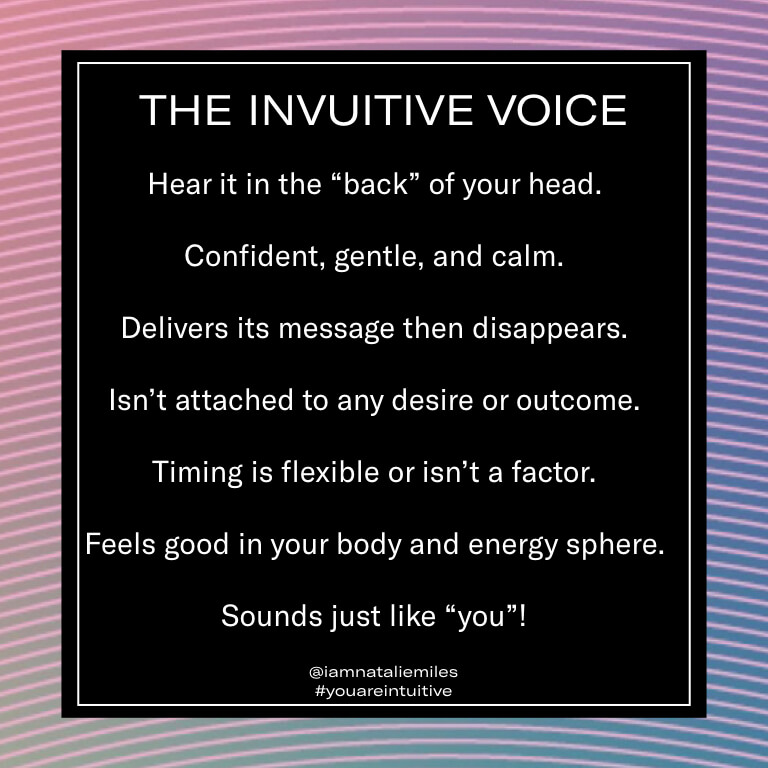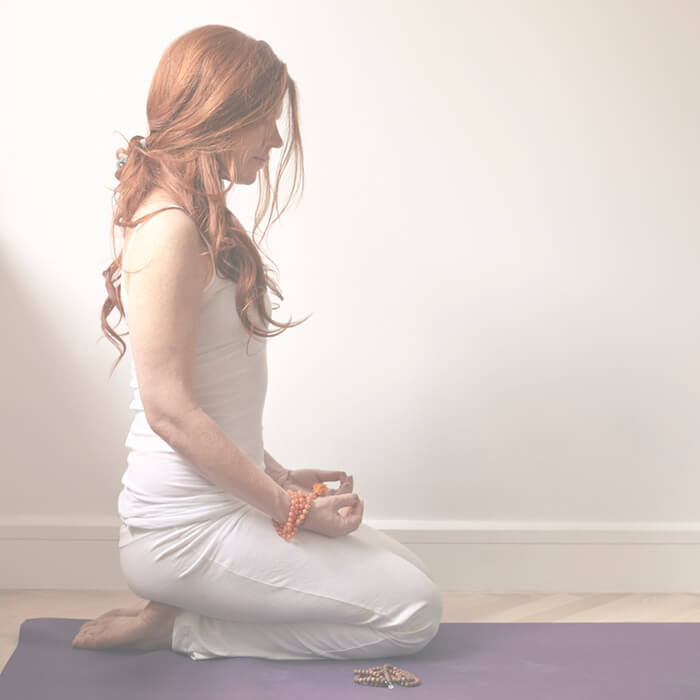How to tell the difference between ego, fear, and intuition, is about learning to listen to—and differentiate between—the different voices in your head, says Natalie Miles.

It’s the question I get asked the most: “How do I trust what my intuition is telling me? How do I know it’s real? Is it all my imagination? Is it my ego talking? Am I making this all up?”
Learning to differentiate between the different voices in your head is often the key missing piece when it comes to trusting your intuition, as it will help you tune into and prioritize what it’s telling you. The thing is, all these voices sound just like you. Let’s take a closer look at the role of these three inner voices.
Your Ego Voice is the voice of your external identity, or how you see yourself in the world. It is also the part of you that keeps up a running commentary of the fears, worries, desires, needs and judgments you generate daily just by being a human in the world. When this chatter is running the show, it’s very hard to hear the softer, gentler voice of your intuition.
It’s easy to see why common wisdom in the New Age community is that the Ego is a “negative” part of us, and that we should do our best to try to transcend it. And it’s true that paying it too much attention can be the cause of so much suffering. But if we truly lived from a place of no Ego, we’d be denying the fact that we’re still humans having a human experience on this planet. Not to mention that when we suppress our fears, desires and the emotions connected to them, it ultimately causes us more pain and suffering. It’s actually when we accept the duality that lies within us, no longer viewing the Ego and its concerns as either good or bad but simply a part of our whole self, that we truly step into our authentic truth and power.
This can also be said for the Fear voice, which is the voice of our inner survival instinct. We are all programmed with a fight, flight, or freeze mechanism to help us respond to danger. The Fear voice is the Ego voice with the volume turned up, and it kicks in during times of panic and acute stress and discomfort. Although this mind is programmed within us to help us survive in these moments, more often than not, it can be hard to distinguish between what is real and our Fear mind causing even more chaos as we lose all perspective. This is why discovering how to use and trust your Intuitive voice during these times is a skill to relearn and master.
Meanwhile, your Intuitive Voice is here to support you and guide you. It’s important to stress again that all these voices will “sound” like you. You’re not going to suddenly hear strange voices from another realm or the “voice of God” in your head. But unlike the Ego / Fear Voice, which is like your personal trainer barking at you, your Intuitive Voice will sound confident, gentle, and calm. You’ll also hear it from the “back” of your head, while the Ego / Fear Voice will come from the “front” of your mind. The Intuitive Voice also isn’t hung-up on things happening on any particular time frame, or on any specific outcome. This can make it feel riskier to trust, as nine times out of ten we want the Intuitive Voice to show up when we need an answer quickly! What actually happens, is that your Intuitive Voice will deliver its message and then disappear —the skill being learning to listen when it speaks to you, versus trying to make it show up when you want. The Ego / Fear Voice on the other hand, is ever-present, chattering away in your head and urging you to act NOW.
This is actually a key way you can distinguish between an ego / fear based message and your intuitive guidance. Notice: what message has been playing on a loop in your head the past day or so? What would happen if you just let the need to act on this go, and trusted that the “real” time and course of action to pursue will simply let itself be known?
Now let’s look at some other ways to tell the difference between ego, fear, and intuition.
QUALITIES OF THE EGO VOICE
-You can’t stop thinking about something and the voice keeps going ‘round and ‘round in your head. Am I doing enough? Should I do something different? Is this going to work?
-The voice has an agenda, expectation, goal, or plan. When am I going to get that job? I need to know if they’re the one. My five-year plan says I should be doing this by now.
-There is a desire for a logical and obvious “solution” to fix a situation or get guidance. I must work out a detailed, step-by-step plan for how to proceed and make changes in my life
-It wants an answer NOW! I should have worked this out by now! I don’t have time to wait! I have a deadline to make a decision.
-The ego voice often uses the words “should,” “would,” or “must.” I should do it this way. I must act now. How would that be perceived?
Location
The Ego voice comes from the front of the head.
In the body
Can make your body feel tense or tight.
Quality of Voice
Chattering
Fast paced
Fearful
Foggy
Easily led
Emotional Guide
Anxiety
Panic
Confidence
Motivation
Overwhelm
Confusion
Frustration
Anger
QUALITIES OF THE FEAR VOICE
-Wants to control everything around them including the actions and emotions of others. The more control I have the “safer” I will be.
-Suspicious and paranoid. Wants to question everything and everyone.
-Kicks in during stressful events, conversations, relationships, uncertainty or trauma. It’s time to get into survival and protection mode.
-Fear of the unknown, uncertainty, and not knowing. What might happen to me? I don’t have a plan. What will this mean for the future?
-Feels like it’s missing out on something. I might miss out on that opportunity. I don’t want to fail at any cost. I want to feel differently from how I am feeling right now.
Location, Emotional Guide, and Quality of Voice
Just like the Ego Voice it comes from the front of the head. It will have the same voice quality and emotional guide as the Ego Voice, but amped up—like having a military general barking orders at you or the volume dial being turned up to MAX. Your whole energetic intuitive body feels like it’s on overdrive, and everything seems overwhelming, chaotic, and out of control.
QUALITIES OF THE INTUITIVE VOICE
-Guidance comes in and then disappears from your mind. Speak to this person. Listen to this creative idea. Do this. Go there. Take action. You will hear it once and it won’t keep niggling at you.
-Isn’t attached to any desire or outcome. Nothing is “right” or “wrong,” and it doesn’t matter what I think I “want.”
-Doesn’t feel forced or have an agenda. I surrender up energetically to what is happening or will happen in the future.
-Feels good in your body and energetic sphere. Something just feels “right” as if I know it to be true.
-Doesn’t feel fixed or logical but you want to know more. May offer up a different path or route that you had not thought of. What about doing it this way?
-Timing is flexible or does not factor at all. It doesn’t matter when it happens, my job is to stay on the path and trust where I am being taken.
-Feels like it wants to support you and guide you. Feels like a best friend or confidante that always wants the best for you. Feels like it has your back and wants you to succeed.
Location
Deep in the back of the head or mind.
In your body
May be felt throughout your whole intuitive body, as body tingles, warmth, cold breeze
(There’s a whole chapter coming up on how you can identify the bodily sensations of your intuitive voice)
Voice Quality
Confident
Calm
Rational
Trustworthy
Guiding
Emotional Guide
Calm
Centered
Balanced
Reassured
Are you starting to tell the difference yet? The next step is to consciously listen out for when your intuition is speaking to you—and then take action on what it says.
///
Excerpted from You Are Intuitive: Trust Your Truth, Take Back Your Power by Natalie Miles, out now with Numinous Books.































